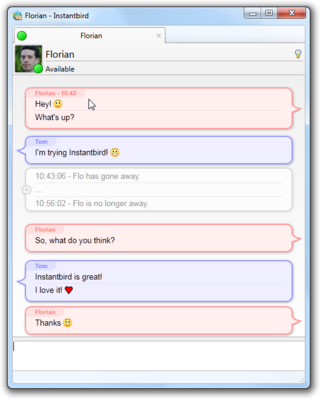Trillian is a proprietary multiprotocol instant messaging application created by Cerulean Studios. It is currently available for Microsoft Windows, macOS, Linux, Android, iOS, BlackBerry OS, and the Web. It can connect to multiple IM services, such as AIM, Bonjour, Facebook Messenger, Google Talk (Hangouts), IRC, XMPP (Jabber), VZ, and Yahoo! Messenger networks; as well as social networking sites, such as Facebook, Foursquare, LinkedIn, and Twitter; and email services, such as POP3 and IMAP.

Pidgin is a free and open-source multi-platform instant messaging client, based on a library named libpurple that has support for many instant messaging protocols, allowing the user to simultaneously log in to various services from a single application, with a single interface for both popular and obsolete protocols, thus avoiding the hassle of having to deal with new software for each device and protocol.

Extensible Messaging and Presence Protocol is an open communication protocol designed for instant messaging (IM), presence information, and contact list maintenance. Based on XML, it enables the near-real-time exchange of structured data between two or more network entities. Designed to be extensible, the protocol offers a multitude of applications beyond traditional IM in the broader realm of message-oriented middleware, including signalling for VoIP, video, file transfer, gaming and other uses.

WebObjects is a discontinued Java web application server and a server-based web application framework originally developed by NeXT Software, Inc.

Psi is a free instant messaging client for the XMPP protocol which uses the Qt toolkit. It runs on Linux, Windows, macOS and OS/2.
HCL Sametime Premium is a client–server application and middleware platform that provides real-time, unified communications and collaboration for enterprises. Those capabilities include presence information, enterprise instant messaging, web conferencing, community collaboration, and telephony capabilities and integration. Currently it is developed and sold by HCL Software, a division of Indian company HCL Technologies, until 2019 by the Lotus Software division of IBM.

ejabberd is an Extensible Messaging and Presence Protocol (XMPP) application server and an MQ Telemetry Transport (MQTT) broker, written mainly in the Erlang programming language. It can run under several Unix-like operating systems such as macOS, Linux, FreeBSD, NetBSD, OpenBSD and OpenSolaris. Additionally, ejabberd can run under Microsoft Windows. The name ejabberd stands for Erlang Jabber Daemon and is written in lowercase only, as is common for daemon software.

Apache JMeter is an Apache project that can be used as a load testing tool for analyzing and measuring the performance of a variety of services, with a focus on web applications.

Google Talk was an instant messaging service that provided both text and voice communication. The instant messaging service was variously referred to colloquially as Gchat, Gtalk, or Gmessage among its users.

Skype for Business Server is real-time communications server software that provides the infrastructure for enterprise instant messaging, presence, VoIP, ad hoc and structured conferences and PSTN connectivity through a third-party gateway or SIP trunk. These features are available within an organization, between organizations and with external users on the public internet or standard phones.

Jitsi is a collection of free and open-source multiplatform voice (VoIP), video conferencing and instant messaging applications for the Web platform, Windows, Linux, macOS, iOS and Android. The Jitsi project began with the Jitsi Desktop. With the growth of WebRTC, the project team focus shifted to the Jitsi Videobridge for allowing web-based multi-party video calling. Later the team added Jitsi Meet, a full video conferencing application that includes web, Android, and iOS clients. Jitsi also operates meet.jit.si, a version of Jitsi Meet hosted by Jitsi for free community use. Other projects include: Jigasi, lib-jitsi-meet, Jidesha, and Jitsi.
Jive is a commercial Java EE-based Enterprise 2.0 collaboration and knowledge management tool produced by Jive Software. It was first released as "Clearspace" in 2006, then renamed SBS in March 2009, then renamed "Jive Engage" in 2011, and renamed simply to "Jive" in 2012.

Etherpad is an open-source, web-based collaborative real-time editor, allowing authors to simultaneously edit a text document, and see all of the participants' edits in real-time, with the ability to display each author's text in their own color. There is also a chat box in the sidebar to allow meta communication.

Instantbird is a discontinued cross-platform instant messaging client based on Mozilla's XULRunner and the open-source library libpurple used in Pidgin. Instantbird is free software available under the GNU General Public License. Over 250 add-ons allow user customization of, and addition of, features. On October 18, 2017, Florian Quèze announced that "... we are stopping development of Instantbird as a standalone product."

Apache Drill is an open-source software framework that supports data-intensive distributed applications for interactive analysis of large-scale datasets. Built chiefly by contributions from developers from MapR, Drill is inspired by Google's Dremel system. Drill is an Apache top-level project. Tom Shiran is the founder of the Apache Drill Project. It was designated an Apache Software Foundation top-level project in December 2016.

Spark is an open-source instant messaging program that allows users to communicate in real time.

OMEMO is an extension to the Extensible Messaging and Presence Protocol (XMPP) for multi-client end-to-end encryption developed by Andreas Straub. According to Straub, OMEMO uses the Double Ratchet Algorithm "to provide multi-end to multi-end encryption, allowing messages to be synchronized securely across multiple clients, even if some of them are offline". The name "OMEMO" is a recursive acronym for "OMEMO Multi-End Message and Object Encryption". It is an open standard based on the Double Ratchet Algorithm and the Personal Eventing Protocol . OMEMO offers future and forward secrecy and deniability with message synchronization and offline delivery.













